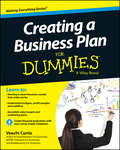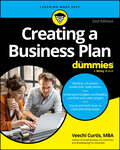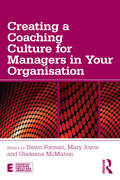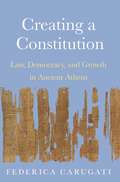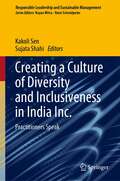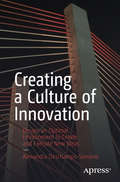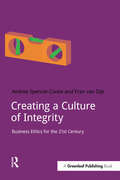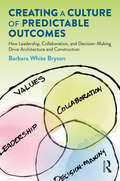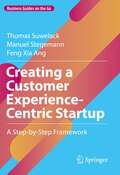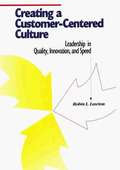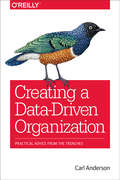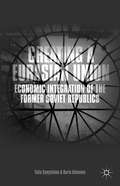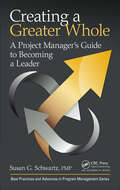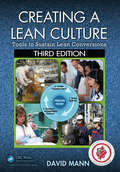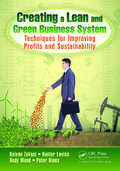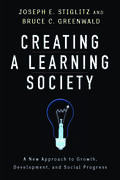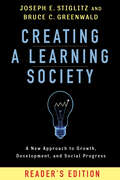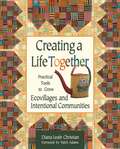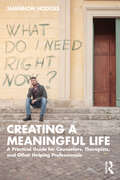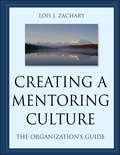- Table View
- List View
Creating a Business Plan For Dummies
by Veechi CurtisEverything you need to know to design a profitable business plan Whether you're starting a new business or you’ve been trading for a while, Creating a Business Plan For Dummies covers everything you need to know. Figure out whether your business idea is likely to work, how to identify your strategic advantage, and what you can do to gain an edge on the competition. Discover why a business plan doesn't have to be a thrity-page document that takes days to write, but can be a simple process that you do in stages as you work through your business concept. Learn how to prepare an elevator pitch, create a start-up budget, and create realistic sales projections. Discover how to predict and manage expenses, and assemble a financial forecast that enables you to calculate your break-even. Look at the risk involved in this business and experiment with different scenarios to see if you’re on the right track. Explains how to create a one-page business plan in just a few hours Takes a simple step-by-step approach, focusing on budgets, financials, and everyday practicalities Offers focused guidance on managing cashflow, designing marketing plans, and establishing a long-term vision for your business Includes access to downloadable templates and worksheets, as well as helpful online audio and video components Written by Veechi Curtis, bestselling author and business consultant A good business plan is the first step to success for any new business, and getting it right can mean the difference between big profits and big trouble. Creating a Business Plan For Dummies gives you the detailed advice you need to design a great business plan that will guide your business from concept to reality.
Creating a Business Plan For Dummies
by Veechi CurtisLearn how to create a sound, profitable business plan that will take your business to the next level Whether you're starting a new business or you’re looking to revitalise your strategy, Creating a Business Plan For Dummies covers everything you need to know. This step-by-step guide shows you how to figure out whether your business idea will work. With Dummies, your business plan can be a simple process that you tackle in stages. You’ll identify your strategic advantage, discover how to gain an edge over your competitors and transform your ideas to reality using the latest tools (including AI!). No matter what type of business you have — products or services, online or bricks-and-mortar — you’ll learn how to create a start-up budget and make realistic projections. How will you predict and manage your expenses? When will your business break even? Dummies will help you assemble a financial forecast that leaves you confident in your calculations! Learn how to review potential risk, experiment with different scenarios to see if you’re on the right track and hone your mindset for a better work-life balance. Establish a smart business model that really works Identify your edge, get ahead of competitors and win the game Create an elevator pitch and a one-page business plan to woo investors Demystify financial projections, build a budget and create cashflow Work smarter by taking advantage of the latest AI and online business tools Having a good plan is the first step to success for any business. Getting it right can mean the difference between big trouble and big profits. Creating a Business Plan For Dummies gives you the detailed advice you need to guide your business all the way from concept to reality.
Creating a Coaching Culture for Managers in Your Organisation (Essential Coaching Skills and Knowledge)
by Dawn Forman Mary Joyce Gladeana McMahonCreating a Coaching Culture for Managers in your Organisation is for managers leaders and coaches interested in extending the practice of coaching to achieve broader organisational outcomes. The book offers a practical approach on how to use coaching strategically to create a culture that supports change, builds leadership capacity, and achieves a high degree of alignment between the goals and aspirations of organisations, and their staff. The authors provide rich case study examples of how coaching has been used in a range of organisations to build capacity, leadership learning, and support new ways of working. Taken together, the chapters provide insight into how organisations can develop a culture that promotes engagement, open and dialogic communication, clarity of expectations, and high performance. This valuable text is a timely contribution to current thinking on leadership, management, and organisation development. It will be of interest to managers, leaders, HR professionals and coaching professionals, as well as students interested in coaching techniques, counsellors, and psychotherapists.
Creating a Community of Purpose: Management Innovation in Action
by Gary Hamel Bill BreenThis chapter provides a portrait of Whole Foods Market and its game-changing business model, in which a company is not just a company but a community of people working to make a difference in the world, and mission matters as much as the bottom line. This chapter was originally published as chapter 4 of "The Future of Management."
Creating a Constitution: Law, Democracy, and Growth in Ancient Athens
by Federica CarugatiA comprehensive account of how the Athenian constitution was created—with lessons for contemporary constitution-buildingWe live in an era of constitution-making. More than half of the world's constitutions have been drafted in the past half-century. Yet, one question still eludes theorists and practitioners alike: how do stable, growth-enhancing constitutional structures emerge and endure? In Creating a Constitution, Federica Carugati argues that ancient Athens offers a unique laboratory for exploring this question. Because the city-state was reasonably well-documented, smaller than most modern nations, and simpler in its institutional makeup, the case of Athens reveals key factors of successful constitution-making that are hard to flesh out in more complex settings.Carugati demonstrates that the institutional changes Athens undertook in the late fifth century BCE, after a period of war and internal strife, amounted to a de facto constitution. The constitution restored stability and allowed the democracy to flourish anew. The analysis of Athens's case reveals the importance of three factors for creating a successful constitution: first, a consensus on a set of shared values capable of commanding long-term support; second, a self-enforcing institutional structure that reflects those values; and, third, regulatory mechanisms for policymaking that enable tradeoffs of inclusion to foster growth without jeopardizing stability.Uniquely combining institutional analysis, political economy, and history, Creating a Constitution is a compelling account of how political and economic goals that we normally associate with Western developed countries were once achieved through different institutional arrangements.
Creating a Culture of Diversity and Inclusiveness in India Inc.: Practitioners Speak (Responsible Leadership and Sustainable Management)
by Kakoli Sen Sujata ShahiThe book addresses the concept of diversity and inclusiveness (D&I) and brings stories from the corporate, practitioners, think tanks and NGOs. It advocates the need and implementation of the D&I concept to build society of the future. It strives to bring out a focused approach in connecting “Theory to Practice”. Every chapter delves into a different area and presents real-time practices as well as the challenges and the way forward. The book explains the various levels at which discrimination can occur such as demographic profiles, regional differences, religious alliances, college pedigree, marital status, sexual preferences, physical disability and health differentiation, pregnancy or returning mothers and technology competence. The book cites examples of inclusion from progressive organizations such as ABB India, Marico, TCS, PNB Metlife and Alsthom. Presenting the business case of D&I, the book emphasizes on creating a robust D&I strategy with a road map and alignment through internal and external frameworks as well as periodic audits. The Responsible, Accountable, Consultant and Informed (RACI) matrix is discussed while setting up the D&I analytics framework within the organization. The book also presents the growing role of artificial intelligence tools that can empower employees to participate in the D&I journey of an organization. It shares how tools such as Balloonr, Glint, Organization View, Planbox, Pluto and Waggl have been specially designed to allow employees to anonymously provide ideas and respond to ideas provided by others. Going forward, the D&I practices will have to be more customized than generalized, and this book brings up real evidences to make its point
Creating a Culture of Innovation: Design an Optimal Environment to Create and Execute New Ideas
by Alexandra Deschamps-SonsinoDeconstruct the history of patterns of innovation in business and connect them to existing and failed attempts in management consultancies, engineering, web technologies and academic institutions. This book shows you how to create an optimal environment at work for growth and innovation. Many large-scale organizations eventually invest in research and innovation as a dedicated part of their businesses. In doing so, they are faced with two choices: build their own practice of innovation or enact patterns of innovation created before them, ones they perceived as "tried and tested." In this book, you will see how patterns of innovation touch many aspects of a worker’s life: from how their work is presented to others, job titles, working environment, and expectations around output. Every chapter will offer a history of these patterns and examples of how they have succeeded and failed within organizations. What You Will LearnIdentify how innovation is named and highlighted in organizationsReveal ways to champion innovation to clients and the outside world, from trade shows and conferences inside the officeUncover ways companies acquire innovation, including incubators or mergersDiscover the conditions for innovation to happen every day, including office layouts, time management, communication structures, and expectation management Who This Book Is ForTech start-up/scale-up founders, management consultants, managing directors, innovation managers and heads of R&D, academic researchers, interior designers, and architects
Creating a Culture of Integrity: Business Ethics for the 21st Century (Doshorts Ser.)
by Andrea Spencer-Cooke Fran van DijkFor companies, unethical business practices like bribery and corruption pose major business risks, and can result in fines, reputational damage, lost business opportunity and – increasingly – criminal or civil charges.Organizations have responded to this critical governance issue with rigorous formal integrity and compliance frameworks, to set out and enforce standards for ethical business practice. But companies also need to create an enduring culture of integrity that establishes doing the right thing as the cultural norm across the organization – and this requires more than compliance alone.Creating a Culture of Integrity identifies the key actions sustainability and compliance officers can take to foster this cultural shift within their organizations.This "one-stop" toolkit for embedding integrity also includes: inspiring best-practice case studies from companies who’ve implemented culture change, with insights on how they deal with ethical dilemmas when these arise and; powerful arguments to help you make the business case for building a strong ethical culture around your compliance system.
Creating a Culture of Predictable Outcomes: How Leadership, Collaboration, and Decision-Making Drive Architecture and Construction
by Barbara White BrysonCreating a Culture of Predictable Outcomes demonstrates the importance of creating cultures in the design and construction industries grounded in sophisticated-caring leadership, high-performing collaborative teams, and master-level decision-making discipline, informed by values, to finally address massive inefficiencies, waste, and unpredictability. Barbara White Bryson offers specific guidance to industry stakeholders to succeed in achieving project-related predictable outcomes by focusing on culture rather than process. This includes selecting the right team members by hiring and firing bravely, valuing psychological safety, leading with values, practicing respect and transparency, fostering empowerment to make decisions at the right level at the right time, and more. This book is a must-read for design and construction professionals who want to finally understand how to set goals and meet those goals for their clients as well as for their teams.
Creating a Customer Experience-Centric Startup: A Step-by-Step Framework (Business Guides on the Go)
by Thomas Suwelack Manuel Stegemann Feng Xia AngThis book explains how startups and brands in general can achieve a high level of customer experience (CX) in today's dynamic and competitive times. A well-structured and easy to apply customer experience framework defines customer experience as the start and end point of all business activities. The framework steps and tools (such as NPS, Empathy Map, Customer Journey, Golden Circle, Design Thinking, A/B-Testing) are designed to have a maximum impact on successful company building and the customer experience, which is key to generate first and repeat buyers that become fans of the company. The tools originate from different disciplines, such as management, design, digitisation or psychology – as only an interdisciplinary approach enables superior insights for initiating the right customer activities in today's highly competitive times. With this book, it is possible to look at customer experience systematically and derive your own strategy towards success. The following are the main contributions of this book: · Provides a clear step-by-step guide to create a customer experience-centric company · Introduces most impactful tools that managers can use to successfully complete every step of our framework · Guides managers through the process of creating a start-up, which is less about magically coming up with innovative business ideas, but rather about applying proven principles in a new context
Creating a Customer-Centered Culture
by Robin L. LawtonCreating a Customer-Centered Culture shows you how to successfully apply existing traditional management tools to knowledge and service work. it teaches you to think like customers so you can implement an organizational culture transformation on your way to total quality management in a jargon-free, step-by-step way.
Creating a Data-Driven Organization
by Carl AndersonWhat do you need to become a data-driven organization? Far more than having big data or a crack team of unicorn data scientists, it requires establishing an effective, deeply-ingrained data culture. This practical book shows you how true data-drivenness involves processes that require genuine buy-in across your company, from analysts and management to the C-Suite and the board.Through interviews and examples from data scientists and analytics leaders in a variety of industries, author Carl Anderson explains the analytics value chain you need to adopt when building predictive business models--from data collection and analysis to the insights and leadership that drive concrete actions. You'll learn what works and what doesn't, and why creating a data-driven culture throughout your organization is essential.Start from the bottom up: learn how to collect the right data the right wayHire analysts with the right skills, and organize them into teamsExamine statistical and visualization tools, and fact-based story-telling methodsCollect and analyze data while respecting privacy and ethicsUnderstand how analysts and their managers can help spur a data-driven cultureLearn the importance of data leadership and C-level positions such as chief data officer and chief analytics officer
Creating a Data-Driven Organization: Practical Advice from the Trenches
by Carl AndersonWhat do you need to become a data-driven organization? Far more than having big data or a crack team of unicorn data scientists, it requires establishing an effective, deeply-ingrained data culture. This practical book shows you how true data-drivenness involves processes that require genuine buy-in across your company, from analysts and management to the C-Suite and the board.Through interviews and examples from data scientists and analytics leaders in a variety of industries, author Carl Anderson explains the analytics value chain you need to adopt when building predictive business modelsâ??from data collection and analysis to the insights and leadership that drive concrete actions. Youâ??ll learn what works and what doesnâ??t, and why creating a data-driven culture throughout your organization is essential.Start from the bottom up: learn how to collect the right data the right wayHire analysts with the right skills, and organize them into teamsExamine statistical and visualization tools, and fact-based story-telling methodsCollect and analyze data while respecting privacy and ethicsUnderstand how analysts and their managers can help spur a data-driven cultureLearn the importance of data leadership and C-level positions such as chief data officer and chief analytics officer
Creating a Eurasian Union
by Yulia Vymyatnina Daria AntonovaCreating a Eurasian Union offers a detailed analysis of the economies of the former Customs Union of Russia, Belarus, and Kazakhstan and the proposed Eurasian Union.
Creating a Greater Whole: A Project Manager’s Guide to Becoming a Leader (Best Practices in Portfolio, Program, and Project Management)
by Susan G. SchwartzCreating a Greater Whole unlocks the not-so-secret secrets of what aspiring managers need to become strong leaders. This information-rich, easy to understand guide offers readers an immediate clear path to honing their leadership skills using the rigor and discipline of project management principles. Topics include stakeholder management, collaborative communication, multi-criteria decision making, and conflict management. Reflective exercises in each chapter raise key questions for readers to craft their own development path. <P><P>The process invites emerging leaders to draw from their past experiences, recognize their intrinsic capabilities, and identify specific skills to cultivate.
Creating a Lean Culture: Tools to Sustain Lean Conversions, Third Edition
by David MannWinner of a Shingo Research and Professional Publication AwardThe new edition of this Shingo Prize-winning bestseller provides critical insights and approaches to make any Lean transformation an ongoing success. It shows you how to implement a sustainable, successful transformation by developing a culture that has your stakeholders throughout the o
Creating a Lean and Green Business System: Techniques for Improving Profits and Sustainability
by Peter Hines Andy Wood Keivan Zokaei Hunter LovinsThings that are good for the planet are also good for business. Numerous studies from the likes of the Economist Intelligence Unit, Harvard, MIT Sloan, and others indicate that organizations that commit to goals of zero waste, zero harmful emissions, and zero use of nonrenewable resources clearly outperform their competition.Like lean thinking, gre
Creating a Learning Society
by Philippe Aghion Joseph E. Stiglitz Kenneth J. Arrow Robert M. Solow Bruce C. GreenwaldIt has long been recognized that most standard of living increases are associated with advances in technology, not the accumulation of capital. Yet it has also become clear that what truly separates developed from less developed countries is not just a gap in resources or output but a gap in knowledge. In fact, the pace at which developing countries grow is largely determined by the pace at which they close that gap.Therefore, how countries learn and become more productive is key to understanding how they grow and develop, especially over the long term. In Creating a Learning Society, Joseph E. Stiglitz and Bruce C. Greenwald spell out the implications of this insight for both economic theory and policy. Taking as a starting point Kenneth J. Arrow's 1962 paper "Learning by Doing," they explain why the production of knowledge differs from that of other goods and why market economies alone are typically not efficient in the production and transmission of knowledge. Closing knowledge gaps, or helping laggards learn, is central to growth and development.Combining technical economic analysis with accessible prose, Stiglitz and Greenwald provide new models of "endogenous growth," upending the received thinking about global policy and trade regimes. They show how well-designed government trade and industrial policies can help create a learning society; explain how poorly designed intellectual property regimes can retard learning; demonstrate how virtually every government policy has effects, both positive and negative, on learning; and they argue that policymakers need to be cognizant of these effects. They provocatively show why many standard policy prescriptions, especially associated with "neoliberal" doctrines focusing on static resource allocations, impede learning and explain why free trade may lead to stagnation, while broad based industrial protection and exchange rate interventions may bring benefits, not just to the industrial sector, but to the entire economy.The volume concludes with brief commentaries from Philippe Aghion and Michael Woodford, as well as from Nobel Laureates Kenneth Arrow and Robert Solow.
Creating a Learning Society: A New Approach to Growth, Development, and Social Progress (Kenneth J. Arrow Lecture Series)
by Joseph E. Stiglitz Bruce C. Greenwald&“A superb new understanding of the dynamic economy as a learning society, one that goes well beyond the usual treatment of education, training, and R&D.&”—Robert Kuttner, author of The Stakes: 2020 and the Survival of American Democracy Since its publication Creating a Learning Society has served as an effective tool for those who advocate government policies to advance science and technology. It shows persuasively how enormous increases in our standard of living have been the result of learning how to learn, and it explains how advanced and developing countries alike can model a new learning economy on this example. Creating a Learning Society: Reader&’s Edition uses accessible language to focus on the work&’s central message and policy prescriptions. As the book makes clear, creating a learning society requires good governmental policy in trade, industry, intellectual property, and other important areas. The text&’s central thesis—that every policy affects learning—is critical for governments unaware of the innovative ways they can propel their economies forward. &“Profound and dazzling. In their new book, Joseph E. Stiglitz and Bruce C. Greenwald study the human wish to learn and our ability to learn and so uncover the processes that relate the institutions we devise and the accompanying processes that drive the production, dissemination, and use of knowledge . . . This is social science at its best.&”—Partha Dasgupta, University of Cambridge &“An impressive tour de force, from the theory of the firm all the way to long-term development, guided by the focus on knowledge and learning . . . This is an ambitious book with far-reaching policy implications.&”—Giovanni Dosi, director, Institute of Economics, Scuola Superiore Sant&’Anna &“[A] sweeping work of macroeconomic theory.&”—Harvard Business Review
Creating a Learning Society: A New Approach to Growth, Development, and Social Progress (Kenneth J. Arrow Lecture Series)
by Joseph E. Stiglitz Bruce GreenwaldIt has long been recognized that an improved standard of living results from advances in technology, not from the accumulation of capital. It has also become clear that what truly separates developed from less-developed countries is not just a gap in resources or output but a gap in knowledge. In fact, the pace at which developing countries grow is largely a function of the pace at which they close that gap. Thus, to understand how countries grow and develop, it is essential to know how they learn and become more productive and what government can do to promote learning. In Creating a Learning Society, Joseph E. Stiglitz and Bruce C. Greenwald cast light on the significance of this insight for economic theory and policy. Taking as a starting point Kenneth J. Arrow's 1962 paper "Learning by Doing," they explain why the production of knowledge differs from that of other goods and why market economies alone typically do not produce and transmit knowledge efficiently. Closing knowledge gaps and helping laggards learn are central to growth and development. But creating a learning society is equally crucial if we are to sustain improved living standards in advanced countries. Combining accessible prose with technical economic analysis, Stiglitz and Greenwald provide new models of "endogenous growth," up-ending thowhe thinking about both domestic and global policy and trade regimes. They show well-designed government trade and industrial policies can help create a learning society, and how poorly designed intellectual property regimes can retard learning. They also explain how virtually every government policy has effects, both positive and negative, on learning, a fact that policymakers must recognize. They demonstrate why many standard policy prescriptions, especially those associated with "neoliberal" doctrines focusing on static resource allocations, have impeded learning. Among the provocative implications are that free trade may lead to stagnation whereas broad-based industrial protection and exchange rate interventions may bring benefits—not just to the industrial sector, but to the entire economy. The volume concludes with brief commentaries from Philippe Aghion and Michael Woodford, as well as from Nobel Laureates Kenneth J. Arrow and Robert M. Solow.
Creating a Learning Society: A New Approach to Growth, Development, and Social Progress, Reader's Edition (Kenneth J. Arrow Lecture Series)
by Joseph E. Stiglitz Bruce GreenwaldSince its publication Creating a Learning Society has served as an effective tool for those who advocate government policies to advance science and technology. It shows persuasively how enormous increases in our standard of living have been the result of learning how to learn, and it explains how advanced and developing countries alike can model a new learning economy on this example. Creating a Learning Society: Reader's Edition uses accessible language to focus on the work's central message and policy prescriptions. As the book makes clear, creating a learning society requires good governmental policy in trade, industry, intellectual property, and other important areas. The text's central thesis—that every policy affects learning—is critical for governments unaware of the innovative ways they can propel their economies forward.
Creating a Life Together
by Patch Adams Diana Leafe ChristianCreating a Life Together is the only resource available that provides step-by-step practical information distilled from numerous firsthand sources on how to establish an intentional community. It deals in depth with structural, interpersonal and leadership issues, decision-making methods, vision statements, and the development of a legal structure, as well as profiling well-established model communities. This exhaustive guide includes excellent sample documents among its wealth of resources.Diana Leafe Christian is the editor of Communities magazine and has contributed to Body & Soul, Yoga Journal, and Shaman's Drum, among others. She is a popular public speaker and workshop leader on forming intentional communities, and has been interviewed about the subject on NPR. She is a member of an intentional community in North Carolina.
Creating a Marketing Plan: An Overview
by Richard LueckeEffective marketing cannot begin without an effective marketing plan. The marketing plan serves to define the opportunity, the strategy, the budget, and the expected results of product sales. In this chapter, the individual elements that comprise the plan are introduced, as are details on how to implement adequate research in considering each decision therein.
Creating a Meaningful Life: A Practical Guide for Counselors, Therapists, and Other Helping Professionals
by Shannon HodgesCreating a Meaningful Life builds on the tenets of mindfulness-based cognitive therapy (MBCT) to answer some of life’s basic questions, such as "How do I create a meaningful, purposeful life?" and "Is the life I am living one that brings me fulfillment, purpose, and a sense of inner peace?" Using a variety of techniques, including journaling, grounding exercises, cognitive self-talk restructuring, and more, chapters invite counseling professionals and students to explore their inner landscape, better understand themselves and find communion with others.
Creating a Mentoring Culture
by Lois J. ZacharyIn order to succeed in today's competitive environment, corporate and nonprofit institutions must create a workplace climate that encourages employees to continue to learn and grow. From the author of the best-selling The Mentor's Guide comes the next-step mentoring resource to ensure personnel at all levels of an organization will teach and learn from each other. Written for anyone who wants to embed mentoring within their organization, Creating a Mentoring Culture is filled with step-by-step guidance, practical advice, engaging stories, and includes a wealth of reproducible forms and tools.
